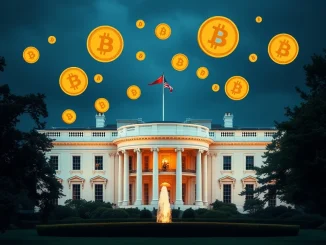
The crypto world is watching closely as the U.S. Department of Justice (DOJ) is set to move forward with the SafeMoon trial, scheduled for May 5th. This development comes as a surprise, especially after an April 7th DOJ memo hinted at a potential softening of the federal stance on digital asset prosecutions. Is this a rogue prosecution or a sign of things to come? Let’s dive into the details of this intriguing case.
Why is the SafeMoon Trial Still Happening?
Despite signals suggesting a shift in DOJ crypto policy, the trial of former SafeMoon CEO Braden Karony is still on track. Karony faces serious allegations – securities fraud, wire fraud, and money laundering – all linked to the alleged misuse of investor funds between 2021 and 2022. These charges paint a grim picture of alleged financial misconduct at the heart of the SafeMoon project.
His legal team attempted to delay the proceedings, arguing that anticipated regulatory changes under a potential Trump administration could impact the case. However, the court swiftly rejected this request, signaling that the trial will proceed as planned, regardless of broader policy discussions. This firm stance from the court underscores the seriousness of the charges against Karony and the DOJ’s determination to pursue the case.
What are the Allegations Against Braden Karony?
The charges against Braden Karony are not trivial. He is accused of:
- Securities Fraud: Allegedly misleading investors about SafeMoon’s tokenomics and the project’s financial health.
- Wire Fraud: Using electronic communications to execute fraudulent schemes and defraud investors.
- Money Laundering: Concealing the source of illegally obtained funds, potentially through complex financial transactions.
These accusations center around the alleged misuse of funds raised from investors during the peak of SafeMoon’s popularity. Prosecutors claim Karony and other executives diverted these funds for personal gain, leaving investors in the lurch as the value of SafeMoon plummeted. The trial aims to uncover the truth behind these allegations and determine Karony’s culpability.
The Broader Context: DOJ Crypto Policy Shift – Or Not?
The timing of the SafeMoon trial is particularly noteworthy because it clashes with recent signals suggesting a potential change in the DOJ’s approach to crypto prosecutions. The April 7th memo mentioned earlier has been interpreted by some as an indication that the DOJ might be pulling back from aggressive enforcement in the crypto space. This perceived shift is fueled by:
- Political Winds: Anticipation of a more crypto-friendly stance from a potential future administration.
- Industry Pushback: Growing criticism from the crypto industry regarding regulatory overreach and its chilling effect on innovation.
- Focus on Clarity: A possible move towards providing clearer regulatory guidelines rather than solely relying on enforcement actions.
However, the decision to proceed with the Braden Karony fraud trial suggests that the DOJ’s commitment to prosecuting alleged financial crimes in the crypto sector remains strong, at least in certain cases. It might indicate a nuanced approach, where the DOJ may be less inclined to pursue regulatory violations, but will continue to aggressively target outright fraud and criminal activity.
What Does This Mean for the Crypto Industry?
The ongoing SafeMoon news and trial have several implications for the broader cryptocurrency industry:
- Continued Scrutiny: Despite any potential policy shifts, crypto projects and executives will remain under regulatory scrutiny, particularly concerning investor protection and financial integrity.
- Importance of Compliance: The case underscores the critical need for crypto businesses to adhere to securities laws and anti-money laundering regulations. Cutting corners can lead to severe legal consequences.
- Investor Awareness: The SafeMoon saga serves as a stark reminder for investors to conduct thorough due diligence before investing in crypto projects, especially those promising unrealistic returns.
- Regulatory Clarity Still Needed: While enforcement actions play a role, the industry still desperately needs clearer and more comprehensive regulatory frameworks to foster responsible innovation and growth.
Key Takeaways from the SafeMoon Trial Development
| Aspect | Implication |
|---|---|
| Trial Proceeding | DOJ remains serious about prosecuting crypto fraud despite policy shift rumors. |
| Serious Charges | Karony faces severe penalties if convicted of securities fraud, wire fraud, and money laundering. |
| Court Rejection of Delay | The legal system is prioritizing the trial over potential future regulatory changes. |
| Industry Impact | Reinforces the need for compliance, investor due diligence, and clearer regulations in crypto. |
Is This the Beginning of the End for Crypto Prosecutions?
While some interpret the DOJ memo as a sign of reduced crypto prosecutions, the SafeMoon trial proceeding suggests otherwise. It is more likely that the DOJ is refining its approach, focusing its resources on cases involving clear-cut fraud and investor harm, rather than broad regulatory enforcement. The industry should not interpret any policy shifts as a green light for unchecked activity. Instead, it should view this as an opportunity to engage in constructive dialogue with regulators to establish clear rules and foster a compliant and sustainable crypto ecosystem.
Final Thoughts: Watching the SafeMoon Trial Closely
The SafeMoon trial is set to be a landmark case in the crypto space. Its outcome will not only determine the fate of Braden Karony but also send a strong message about the DOJ’s stance on crypto-related financial crimes. As the trial unfolds, the crypto community will be keenly observing, hoping for clarity and justice in this high-stakes legal battle. Stay tuned for further updates as the trial progresses and sheds more light on the complexities of crypto regulation and enforcement.



